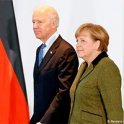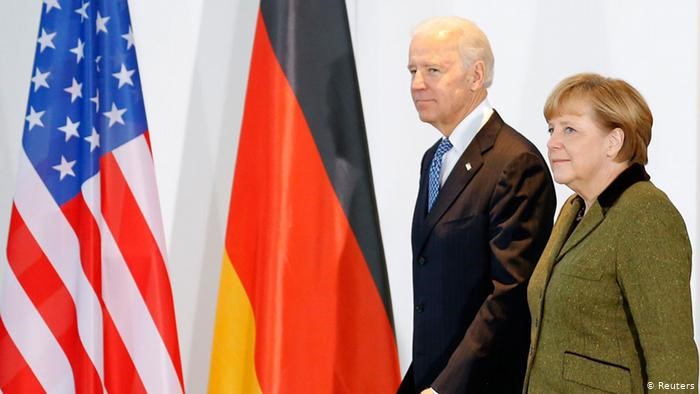Global Risk Perspectives - Monthly insights on geopolitics, trade & climate
Back to articlesBernardo Pires de Lima 

18.05.2021
Short-term trends
The first major trend is the White House swiftly rolling back the Trump administration’s stance. From belligerence to diplomacy, from transactional to predictable, from aggressive to approachable, from unilateral to multilateral, from chaotic to systematic, from constant agitation to zero outrage. Getting vaccination on track, as well as putting through major federal financial relief packages, and the international dynamic created, has led the IMF to estimate the American economy will recover faster than initially expected. This matters to the way Biden will handle upcoming congressional election in November 2022 and is key to generating confidence in the international alliance system that places significant expectations on the US. The prevailing trend is to aggregate allies in the Indo-Pacific and European spheres, counteracting China's growing influence. It's in this context that many democracies will have to make difficult choices in the near future relating to the digital domain, infrastructure, banking, pharmaceuticals, defence, and power. Furthermore, European economies more tightly connected with American recovery (United Kingdom, Ireland, the Netherlands, Germany) follow this trend expectantly so they may combine economic and political protagonism. This is of particular importance, as Berlin may, after its September elections, a cabinet led by the Green Party, which will be more hostile to Moscow and Beijing. Over in the UK, government may want to handle internal cohesion sensibly with regard to the outcome of Scottish elections and mounting tension in Northern Ireland, whereas in the Netherlands political parties may drift further apart.
Another trend will be the pace of post-Covid-19 economic recovery. Leading forecasts point to faster recovery in large economies, such as the US, China, Japan, Germany, or Britain, in stark contrast with the slower pace of emerging economies such as Turkey, Brazil or Colombia. Beyond the effects on internal political stability and confidence in external action, we can see capital shifting away from emerging economies, which deepens gaps within the G20 — and in addition to macroeconomic imbalance, it presents significant increases in average public debt among its members, having jumped to 103% of GDP in 2021 from 82% in 2019. Which is to say economic pressure goes hand in hand with financial pressure. This may, combined with the vulnerabilities it creates, lead to errors in regional assessment, namely of the involvement in crises in the Middle East, Latin America or Central Asia, now that NATO's peacekeeping mission in Afghanistan draws to a close.
A third trend will be defined by the type of recovery, closely connected with the nature of post-pandemic societies. Over the past year we’ve understood that, despite the great cost faced by businesses trying to stay afloat, businesses and companies expanded their adaptability, adjusted business models, value chains and remote work to create new products and services. All of this forced adjustment period will have formed a basis for more advanced economies to build on, and they will, additionally, have government or multilateral funds to consolidate the transitions they must undertake. But there are at least two takeaways from that.
The first is that massive, accelerated digital transformation of economies doesn't mean every country will step forward in unison, which will lead to imbalance. For example, if we take into account the Financial Times’ ranking of the leading 1000 corporations in Europe on growth 2016-2019, we realize that, out of the top 50, 16 are technology businesses and 5 are fintech; so, dominant sectors in that 50-company group. Within that group, 14 are British, 10 are German, 5 are Italian, 4 are French, 4 are Dutch and 3 are Spanish. There are no Portuguese companies in the top 100 (the highest-ranked one appears at 111), and Portugal is represented by 7 corporations in a set of 1000. That brings us to our second takeaway. It is necessary to balance cutting-edge technology services with industrial capability, not only to absorb new, qualified talent but also to retrain existing talent that may be lagging behind, incorporating science, digitalization, and adding value to both regional markets and global value chains. Segments such as textiles, electronics- or transportation-related ore extraction, but also agriculture, ocean-based industries and clean energy can provide some less technologically competitive countries with sufficiently differentiating factors to help them stand out in a post-Covid world.

We must also realize that budgeting policies have been expansive, rather than restrictive, which impacts debt and deficits but also places the State as a pillar of contemporary societies, predictably through a growing presence in wealth distribution, putting greater tax burdens on those who have more and increasingly besieging major multinational corporations who’ve become a little too adept at "tax planning”. Politically, there will be a more or less consensual transition to social democracy with impacts on party variety. These parties will either rally around social democracy or vehemently argue against it. This period will draw curtains on the era begun with the 2008 recession, which fragmented democratic party systems across the West, segmenting parliamentary representation even further than before, deteriorating the signal-to-noise ratio, elevating fringe actors and making it more difficult to form stable cabinets. Spain, for example, held five parliamentary elections between 2011 and 2019.
This social-democrat tendency, which, in Germany's case, comprises the SPD, the Green Party and a segment of the CDU that feels orphaned by Angela Merkel, is comfortable with government taking a more prominent role and, to an extent, favors giving the EU more tools and powers to face future crises, be they health, migration or financial ones. This is probably the debate that will set the tone at the Conference on the Future of Europe, a dynamic which, across the Atlantic, will see the Biden Administration trying to implement the greatest economic development plan in America's history.
This means that a transatlantic political convergence will run parallel to a socio-economic dynamic relying on working more closely than ever, which may favour the reopening of an ambitious trade agreement, a joint strategy to regulate digital governance, more ambitious goals in combating climate change and a joint reform agenda in a few relevant multilateral organizations, such as the WTO and WHO.
We can be certain of one thing: the stronger the transatlantic convergence, the more adversary powers will want to undermine that understanding.
Disclaimer: Bernardo Pires de Lima, research fellow with the Portuguese Institute of International Relations (Instituto Português de Relações Internacionais) at Nova University of Lisbon.
The views, thoughts and opinions expressed herein belong solely to the author and do not reflect the official positions or policies of, or obligate, any institution, organization or committee he may be affiliated with.
Bernardo Pires de Lima is Political Adviser to the President of the Portuguese Republic. He is also a Research Fellow at the Portuguese Institute of International Relations, IPRI-NOVA, an international politics analyst for the national Portuguese television channel RTP, for radio station Antena 1 and the Portuguese daily Diário de Notícias. He chairs the Luso-American Development Foundation’s (FLAD) Curators Council and has been a Research Fellow at the Johns Hopkins Center for Transatlantic Relations in Washington DC and at the National Defense Institute in Lisbon, Portugal. He has penned eight books on contemporary international politics, the most recent being Portugal na Era dos Homens Fortes: Democracia e Autoritarismo em Tempos de Covid (Portugal in a time of strongmen: Democracy and authoritarianism in a time of Covid), published by Tinta-da- China in September 2020.



